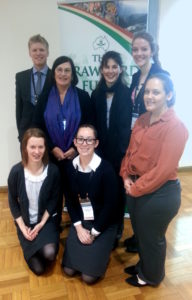
2014 Young Scholar: Georgina Coggins

Front: Julia de Bruyn, Katherine Ashley, Kirsty McCormack
Georgina Coggins
University of Sydney
Sponsored by the NSW Committee
Georgina has always been involved in agriculture. Her father has a beef enterprise and her mother is a dairy farmer’s granddaughter. She was raised to see the importance of the land and the effect of drought and government policy on farmers. Georgina is passionate about the sustainability of agriculture. She also has a keen interest in the importance of agriculture to feed a growing population and in export markets. She hopes to pursue a career in the area of alleviating hunger in the developing world that is mindful of sustainable use of resources. She is undertaking a degree in Resource Economics to understand market demand and optimised resource allocation. She saw the Conference as an opportunity to further her understanding of current research and connect with like-minded individuals.
Conference report
There are major obstacles in the world’s future and I believe that as a university graduate I can work with solving this issues, having gained a greater understanding now.”
The Crawford Conference was a phenomenal opportunity and experience to engage with individuals working within the agricultural sector. The broad nature of speakers was inspiring and gave great context, as well as depth to the debate. Throughout the conference I learnt of the hardships we are facing or yet to face as a global community, and the grassroots solutions which are endeavouring to make a difference before greater problems arise.
It is estimated that by 2050 there will be a population of around 9 billion people on earth, and this comes with major complications. As first mentioned by Rachel Kyte and later referenced by multiple speakers, these issues include rapid urbanisation, hunger, malnourishment, obesity, food waste, climate change, food insecurity, inefficient policy and significant costs to the economy, society and global politics. The demand for food is set to soar, and it is yet to be seen whether we can achieve a balance between productivity and environmental preservation to feed this demand adequately.
Hearing Rachel Kyte (World Bank), Shenggen Fan (International Food Policy Research Institute) and Luke Chandler (Rabobank) were among the highlights of the conference day. As a group they gave terrific insight into the problem from a global level, as well as from the grassroots supply chain. It was particularly fascinating listening to the potential solutions, some of which are currently being instigated. Programs such as genetic modification, empowering women financially and through education, technology innovation, trade agreements and in particular policy changes. I have a strong desire to work within the government on constructing effective policy, and the conference gave me greater insight into the paths in which policy may take.
However, of all the amazing experiences, one of the best things was the Scholars day on which Professor Catherine Bertini spoke. Her words of wisdom were directly applicable to us an undergraduates, in regards to our career opportunities. As an economics major, opposed to science, I found her experiences more relevant to my potential future. I believe having speakers from all different sides of the issue (science, economics and political) was integral in understanding the multiple chains of impact we can have. And this was effectively delivered by the conference. Not only did I learn about the grassroots impact, but also the global consequences and necessities for the future of our society.
I found this conference highly beneficial in giving me a broader knowledge of an industry I strongly want to be a part of. There are major obstacles in the world’s future and I believe that as a university graduate I can work with solving this issues, having gained a greater understanding now. Despite knowing of these issues prior to the conference, the week gave me the opportunity to have a greater understanding of the facts and which organisations are working towards solutions.
